Vitamin E Capsules For Skin: 10 DIY Remedies For Brightening
Harness the goodness of these capsules' high antioxidant content for anti-aging effects.

Image: Shutterstock
Raise your hand if you ever wondered how to use vitamin E capsules for your skin or have popped them open for topical use. Most of us have done it as this antioxidant has anti-aging properties and is a solution to most skincare woes.
You can replenish vitamin E deficiency by consuming vitamin E-rich foods. However, if your diet cannot meet the daily recommended dose of vitamin E, you can consult a doctor and take supplements. This article discusses the different ways to use vitamin E capsules for skin health, associated risks, and who should take and avoid them. Keep reading to learn more.
In This Article
What Is Vitamin E?
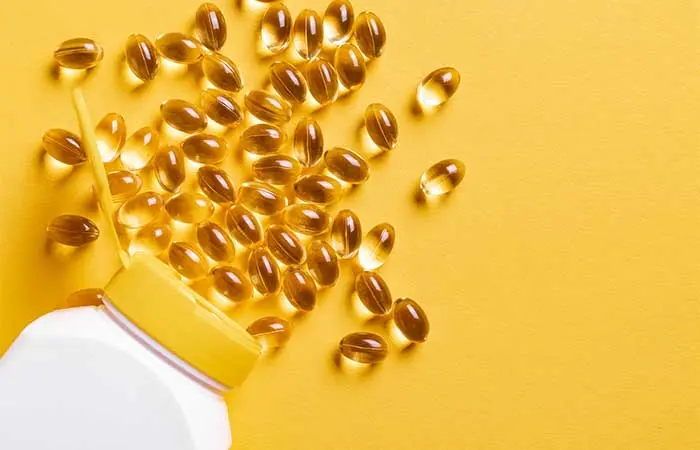
Vitamin E is a type of fat-soluble vitamin that has unique benefits for the skin. Vitamin E is a potent antioxidant and helps prevent premature aging, sun damage, and inflammation (1).
It also supports skin hydration, strengthens the skin barrier, and improves moisture retention. Additionally, Vitamin E is also known for its healing properties. It aids in repairing damaged skin and reduces the appearance of scars and fine lines (2).
Incorporating Vitamin E into skincare routines can significantly enhance skin health, leaving it vibrant and youthful.
Key Takeaways
- Vitamin E can be used as a supplement or applied to your skin directly.
- Vitamin E is a potent antioxidant and has anti-aging, skin brightening, and anti-inflammatory properties.
- Vitamin E capsules can be popped and applied to the skin directly to reap the benefits.
- But if you have eczema or psoriasis, you should not apply vitamin E directly to your skin.
Ways To Use Vitamin E Capsules For Skin
There are two ways you can use a vitamin E capsule for your skin:
- Consume as a supplement.
- Apply directly to your skin.
Both have similar benefits and results. Keep reading to know about the many benefits of vitamin E capsule for skin.
Benefits Of Vitamin E Capsules For Skin
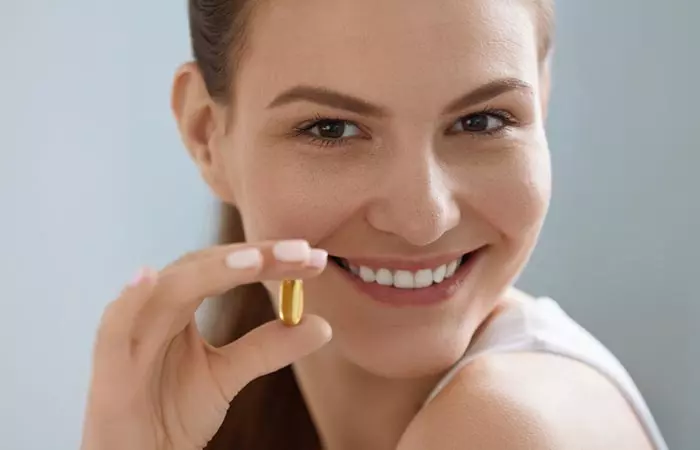
- Loaded With Antioxidants
Vitamin E contains alpha-tocopherol, a powerful antioxidant that protects your skin from harmful free radicals
(3). Several anti-aging creams contain a mix of vitamin C and vitamin E as they work better together to protect the skin from sun damage and aging (4), (5).
- Prevents UV Damage
Vitamin E cannot shield your skin from UV rays on its own. It needs to be used in combination with products containing vitamin C to protect your skin from the harmful effects of UV rays. However, it can help prevent UV-induced free radical damage (6).
Elle, a blogger, shares how she uses vitamin E to prevent UV damage: “To mix up my beauty routine, especially before I hit the beach, I make a quick vitamin E sugar scrub. I have the capsules, but the actual vitamin E oil works great too (i).”
- Moisturizes Your Skin
Vitamin E contains tocopherols and tocotrienols that moisturize your skin and keep it glowing and hydrated.
The topical application of vitamin E contributes to the antioxidant defenses of your skin (6). This can help your skin stay healthy.
- Reduces Signs Of Aging
Aging decreases collagen production and leads to wrinkles and loose skin. Dark spots and dry skin due to a poor diet or lifestyle can also make the skin look aged. Vitamin E is a strong antioxidant and a moisturizer. It helps reduce fine lines, wrinkles, and dark spots and treats and dry skin (7).
- Brightens The Skin
An uneven skin tone or dryness due to aging or toxin buildup can make the skin look dull and lusterless. Scientists have found that external application of vitamins E and C helps reduce the harmful free oxygen radicals (that make the skin look aged and dull). These nutrients may also brighten the skin (8).
- Reduces Inflammation
Several studies have demonstrated the anti-inflammatory properties of vitamin E. These properties boost the process of skin regeneration in which the dead skin cells are replaced by healthier cells, making your face radiant. It also protects your skin from environmental damage (5).
- May Heal Sunburn
Vitamin E has antioxidant properties that can help neutralize free radicals generated by sun exposure, reducing skin inflammation and promoting healing. Applying vitamin E oil or creams directly onto sunburned areas can soothe the skin, reduce redness, and alleviate discomfort (9).
These are the benefits of vitamin E capsules. As mentioned before, you can either consume vitamin E capsules or apply them directly to your skin. If you’re wondering how to use vitamin E capsules for your face, scroll down.
 Did You Know?
Did You Know?How To Apply Vitamin E Capsules On Your Face
1. Vitamin E Capsule Mask For Skin Brightening
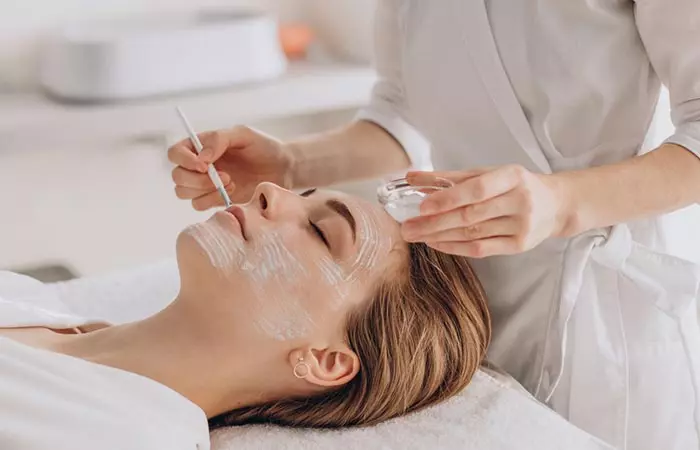
Squeeze the oil from 2 vitamin E capsules and mix it with 2 tablespoons of organic yogurt and a few drops of lemon juice. Mix well and apply on your face. Wash it off after 15 minutes. Use this vitamin E capsule for a face mask two times a week.
Vitamin E and yogurt cleanse all the impurities from your skin and improve its elasticity. Yogurt contains lactic acid, which nourishes and moisturizes your skin and brightens dull skin by reducing blemishes and dark spots (10). Lemon juice acts as a natural skin lightening agent (11).
Caution: Avoid this remedy if you have sensitive skin as lemon juice may cause redness and irritation.
2. Vitamin E Capsule For Reducing Acne Scars
Apply the Vitamin E oil from the capsule directly on your face or the affected area and leave it on overnight. Do this regularly until the marks disappear.
Vitamin E contains antioxidants that help in repairing damaged skin cells and reducing the appearance of blemishes (3). Using vitamin E oil for scars can be particularly effective, as it supports skin regeneration and helps fade stubborn marks over time with consistent use.
3. Vitamin E Capsule For Fading Dark Circles
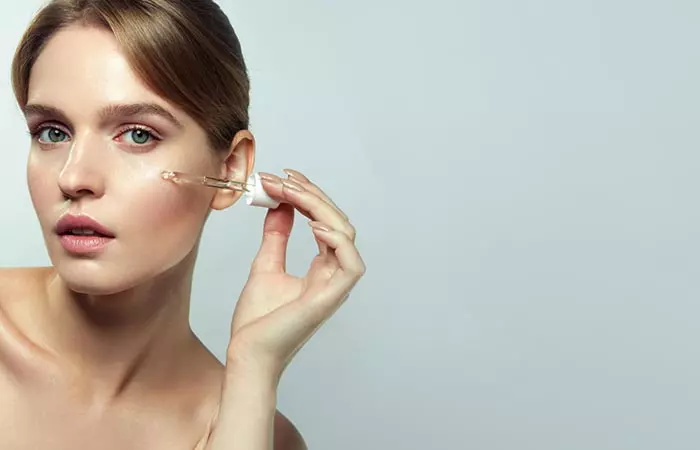
Apply the Vitamin E oil from the capsules directly to the area around your eyes. Massage it gently and leave it on overnight. Use it regularly for at least 2-3 weeks to see visibly lighter and brighter undereye area.
Anecdotal evidence suggests that vitamin E oil can help fade dark spots and reduce puffiness. However, there is no scientific evidence to support it.
4. Vitamin E Capsule For Glowing Skin
Mix vitamin E oil from 3-4 capsules with 2 tablespoons papaya paste and 1 teaspoon organic honey. Apply the mask to your face and neck and leave it on for 20-25 minutes. Wash your face. Do this three times a week.
Papaya peel contains papain, which has skin lightening properties (12). Vitamin E nourishes your skin and repairs the cells, and honey keeps it moisturized.
5. Vitamin E Capsule For Hyperpigmentation
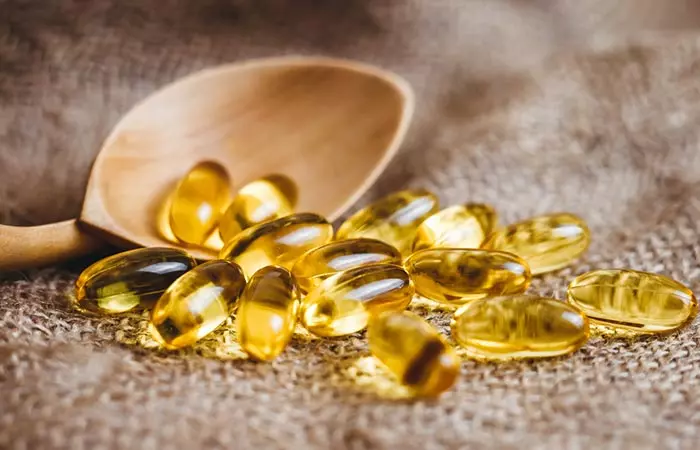
Squeeze the vitamin E oil from the 2 capsules and mix it with 1 tablespoon of extra virgin olive oil. Gently massage it to your face for 10 minutes. Leave it on for at least an hour or overnight. Use this three times a week.
Vitamin E repairs damaged skin cells, and olive oil moisturizes your skin and boosts cell regeneration (13). This may help in reducing dark spots and pigmentation.
6. Vitamin E Capsule For Dry Skin
Mix the oil from two vitamin E capsules with 1 teaspoon organic honey and 2 tablespoons of milk. Apply it on your face. Wait for 20 minutes before washing it off. Do this three times a week.
Milk contains lactic acid, which helps in lightening and nourishing your skin (9). Honey helps in preserving moisture (14). Using vitamin E capsules for the face helps repair and nourish your skin cells.
7. Vitamin E Oil For Smooth Skin

Mix vitamin E oil from one capsule with 2 tablespoons of rose water and a teaspoon of glycerin. Apply it on your face. Leave it on overnight. Follow this remedy 2-3 times a week.
Glycerin is a humectant that attracts moisture and makes your skin soft and smooth (15). Vitamin E keeps your skin nourished and revitalized.
8. Vitamin E Capsule For Soothing Skin Allergies
Mix vitamin E oil from two capsules with extra virgin coconut oil and two drops each of tea tree and lavender oils and massage it on your face. Wash it off after 30-60 minutes with warm water. You can do this two times daily.
Vitamin E and lavender essential oils have anti-inflammatory properties (16). Tea tree and extra virgin coconut oils have antimicrobial properties and facilitate healing (17), (18).
9. Vitamin E Capsule For Itchy Skin
Mix vitamin E oil from a capsule with extra virgin coconut oil and massage it on your face. Do this every day.
Coconut oil can help reduce itching as it hydrates and nourishes your skin (18). Vitamin E repairs your skin and reduces inflammation.
10. Vitamin E Capsule For Dark Spots
Mix the oil from two vitamin E capsules with a tablespoon of fresh aloe vera gel and massage it into your skin. Leave it on for 15 to 20 minutes and then wash off.
Aloe vera repairs your skin and promotes spot reduction and pigmentation induced by UV rays. These effects are due to aloesin, a melanin and tyrosinase reducing agent in aloe vera (19). Vitamin E is rich in antioxidants that protect your skin from free radical damage.
 Did You Know?
Did You Know?These are the 10 uses of Vitamin E capsules for the face to get glowing and youthful skin. But before you buy them, here’s what you need to look for.
What To Look For Before Buying Vitamin E Capsules?
Tablets, capsules, soft gels, and oils – you will find vitamin E in almost every medical store in these forms. Whether you are buying vitamin E capsules to make a face pack or for consumption, you need to ensure that you are buying the best product for your skin. Vitamin E capsules can be:
- Natural: This type of vitamin E contains d-alpha-tocopherol. Out of all the vitamin E variants, this is the most active type, and your body absorbs it quite easily.
- Synthetic: This is man-made vitamin E that consists of eight isomers. Out of the eight, only one isomer is similar to natural vitamin E.
Pro Tip:
While buying vitamin E capsules, make sure you check the label. If it is natural, the vitamin E will be listed under these names: d-alpha tocopheryl acetate, d-alpha tocopherol, or d-alpha tocopheryl succinate.
Taking the right amount of vitamin E is just as important as buying the right kind. Learn more about its recommended dosage in the next section.
How Much Vitamin E Should You Take?
The recommended daily allowance (RDA) for vitamin E varies based on age, sex, and life stage. For adults, including pregnant and breastfeeding women, the RDA is 15 milligrams (22.4 IU) of vitamin E daily. It is important to note that vitamin E requirements can often be met through a balanced diet by consuming foods like nuts, seeds, spinach, and broccoli. While supplements can be beneficial for individuals with deficiencies or specific health conditions, it is essential to consult a healthcare provider before taking vitamin E supplements.
Although vitamin E and vitamin E oil (derived from vitamin E) have many benefits for skin, there are risks that you must be aware before you consume or apply it to your skin. Heres a list of potential side effects of vitamin E capsules.
Vitamin E Capsule Risks
- May cause allergic reactions.
- May cause contact dermatitis (20).
Do a patch test to be on the safe side. Apply a small amount of vitamin E capsule to your jaw area and wait for 24 hours. Check for any allergic reactions. That said, vitamin E capsules may not suit all. Keep reading to know if you can take vitamin E capsules in the first place.
Who Should Avoid Vitamin E Capsules
- Avoid applying vitamin E capsules if you have eczema or psoriasis (21).
- Avoid taking vitamin E supplements if you have bleeding disorders (22).
- Avoid vitamin E capsules if you have are allergic to them.
Infographic: Top 5 Vitamin E Packs For The Face
Enriched with an abundance of antioxidants that promote anti-aging and repair damaged skin cells, vitamin E oil has taken its reigning throne in the beauty world. It not only tackles early signs of aging but also brightens and moisturizes the skin, earning its top position as the ultimate solution for most skin problems. You can use vitamin E capsules for skin whitening as well.
Check out the infographic below for various vitamin E oil face packs to try at home.
Some thing wrong with infographic shortcode. please verify shortcode syntaxVitamin E is a potent antioxidant used extensively in skincare products to achieve beautiful and healthy skin. To get the maximum benefits, you may apply vitamin E oil to your face or consume supplements (only if you have a deficiency). It helps improve skin texture, and signs of aging and keeps the skin hydrated and soft. Follow the tips discussed in the article to use vitamin E capsules for your face. However, consult a doctor beforehand if you want to consume vitamin E supplements. Excess vitamin E can be harmful to the body.
Frequently Asked Questions
Does vitamin E remove tan?
No, vitamin E cannot remove tan completely. Dr. Nadir Qazi, a board-certified physician, says, “Vitamin E by itself will not remove a tan. However, combining it with lemon juice or vitamin C may help reduce the damage done by ultraviolet radiation and lighten a tan.” However, he warns that lemon juice may be irritating to the skin and increase the likelihood of sunburns, causing a condition called phytophotodermatitis or PPD.
Can vitamin E remove pimples?
Dr. Qazi says, “Vitamin E may reduce the inflammation surrounding a pimple. However, it is best to consult with your doctor if you have active outbreaks or sensitive skin as carrier oils for vitamin E are often comedogenic and may clog pores further.”
Does vitamin E capsule darken the skin?
No, vitamin E is a powerful antioxidant that helps improve skin tone and fade away dark spots and blemishes.
Can we apply vitamin E capsules to the lips?
Yes, you can cut a vitamin E capsule and apply it directly to your lips. It would help keep your lips plump and moisturized.
Can I wash my face with soap after applying vitamin E capsules?
While vitamin E tends to get absorbed into the skin pretty fast, you may choose to rinse it off if you have oily acne-prone skin.
Is vitamin E capsule good for oily face?
Vitamin E oil may not be suitable for oily skin as it may clog pores and cause skin congestion.
Illustration: Vitamin E Capsule For Skin: Benefits And How To Use On Face
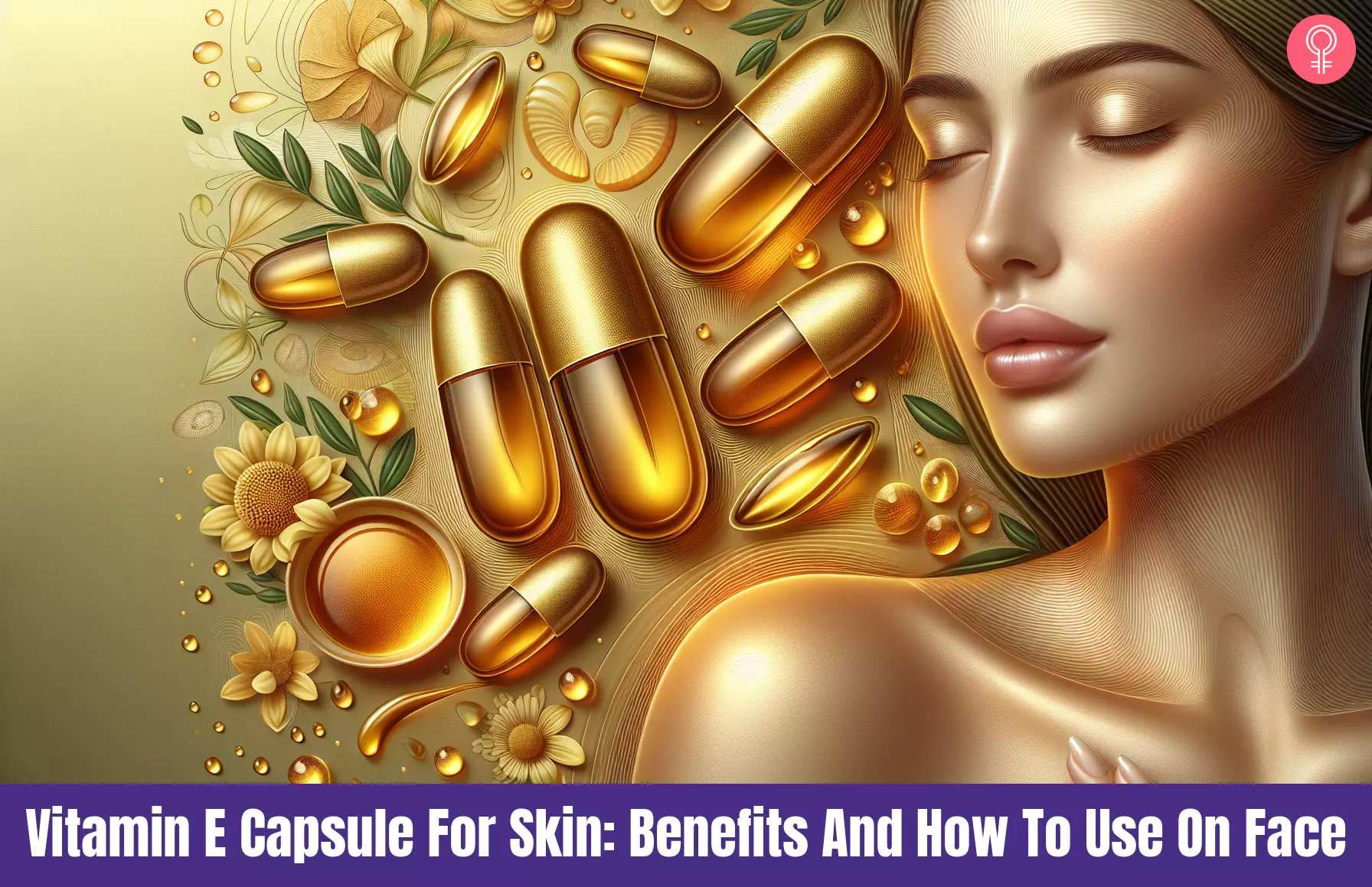
Image: Dall·E/StyleCraze Design Team
Applying Vitamin E topically can have multiple benefits for your skin. Watch this video to learn how to apply Vitamin E capsules the right way to get glowing, healthy skin. Check it out now!
Personal Experience: Source
StyleCraze's articles are interwoven with authentic personal narratives that provide depth and resonance to our content. Below are the sources of the personal accounts referenced in this article.
i. BEAUTY DIY: VITAMIN E SUGAR SCRUBhttps://www.ellesees.net/2012/05/beauty-diy-vitamin-e-sugar-scrub.html?m=0
References
Articles on StyleCraze are backed by verified information from peer-reviewed and academic research papers, reputed organizations, research institutions, and medical associations to ensure accuracy and relevance. Read our editorial policy to learn more.
- The role of vitamin E in normal and damaged skin
https://pubmed.ncbi.nlm.nih.gov/7633944/ - Discovering the link between nutrition and skin aging
https://www.ncbi.nlm.nih.gov/pmc/articles/PMC3583891/ - Vitamin E
https://ods.od.nih.gov/factsheets/VitaminE-HealthProfessional/ - Vitamin E in dermatology
https://www.ncbi.nlm.nih.gov/pmc/articles/PMC4976416/ - Skin Photoaging and the Role of Antioxidants in Its Prevention
https://www.ncbi.nlm.nih.gov/pmc/articles/PMC3789494/ - Vitamin E and Skin Health
https://lpi.oregonstate.edu/mic/health-disease/skin-health/vitamin-E - Formulations of hydrogels and lipogels with vitamin E
https://pubmed.ncbi.nlm.nih.gov/17129265/ - Antiaging and brightening effects of a topical treatment containing vitamin C, vitamin E, and raspberry leaf cell culture extract: A splitface, randomized controlled trial
https://www.ncbi.nlm.nih.gov/pmc/articles/PMC7027822/ - Reduction of sunburn damage to skin by topical application of vitamin E acetate following exposure to ultraviolet B radiation: effect of delaying application or of reducing concentration of vitamin E acetate applied
https://pubmed.ncbi.nlm.nih.gov/8023094/ - The effects of topical l(+) lactic Acid and ascorbic Acid on skin whitening
https://pubmed.ncbi.nlm.nih.gov/18505528/ - The Hunt for Natural Skin Whitening Agents
https://www.ncbi.nlm.nih.gov/pmc/articles/PMC2801997/ - Papain Degrades Tight Junction Proteins of Human Keratinocytes In Vitro and Sensitizes C57BL/6 Mice via the Skin Independent of its Enzymatic Activity or TLR4 Activation
https://www.ncbi.nlm.nih.gov/pmc/articles/PMC4471117/ - Effect of Olive Oil on the Skin
https://www.researchgate.net/publication/275044663_Effect_of_Olive_Oil_on_the_Skin - Honey in dermatology and skin care: a review
https://pubmed.ncbi.nlm.nih.gov/24305429/ - The influence of a cream containing 20% glycerin and its vehicle on skin barrier properties
https://pubmed.ncbi.nlm.nih.gov/18498456/ - Effect of Lavender (Lavandula angustifolia) Essential Oil on Acute Inflammatory Response
https://www.ncbi.nlm.nih.gov/pmc/articles/PMC5878871/ - Melaleuca alternifolia (Tea Tree) Oil: a Review of Antimicrobial and Other Medicinal Properties
https://www.ncbi.nlm.nih.gov/pmc/articles/PMC1360273/ - In vitro anti-inflammatory and skin protective properties of Virgin coconut oil
https://www.ncbi.nlm.nih.gov/pmc/articles/PMC6335493/ - Are Natural Ingredients Effective in the Management of Hyperpigmentation? A Systematic Review
https://www.ncbi.nlm.nih.gov/pmc/articles/PMC5843359/ - Vitamin E and Risk of Type 2 Diabetes in the Womens Health Study Randomized Controlled Trial
https://diabetes.diabetesjournals.org/content/55/10/2856 - Why don’t we use vitamin E in dermatology?
https://www.ncbi.nlm.nih.gov/pmc/articles/PMC1485678/ - Vitamin E Toxicity
https://www.ncbi.nlm.nih.gov/books/NBK564373/
Read full bio of Dr. Vindhya L Veerula
- Dr. Nadir Qazi, DO, has over 6 years of experience in cosmetic dermatology and plastic surgery. He is a member of the American Academy of Cosmetic Surgery and an instructor for advanced injections and laser techniques. He is well-known among celebrities and elite models for his promising liposuction results and his innovative facial contouring technique known as the HD Lift™.
 Dr. Nadir Qazi, DO, has over 6 years of experience in cosmetic dermatology and plastic surgery. He is a member of the American Academy of Cosmetic Surgery and an instructor for advanced injections and laser techniques. He is well-known among celebrities and elite models for his promising liposuction results and his innovative facial contouring technique known as the HD Lift™.
Dr. Nadir Qazi, DO, has over 6 years of experience in cosmetic dermatology and plastic surgery. He is a member of the American Academy of Cosmetic Surgery and an instructor for advanced injections and laser techniques. He is well-known among celebrities and elite models for his promising liposuction results and his innovative facial contouring technique known as the HD Lift™.
Read full bio of Ramona Sinha
Read full bio of Eshna Das
Read full bio of Shiboli Chakraborti








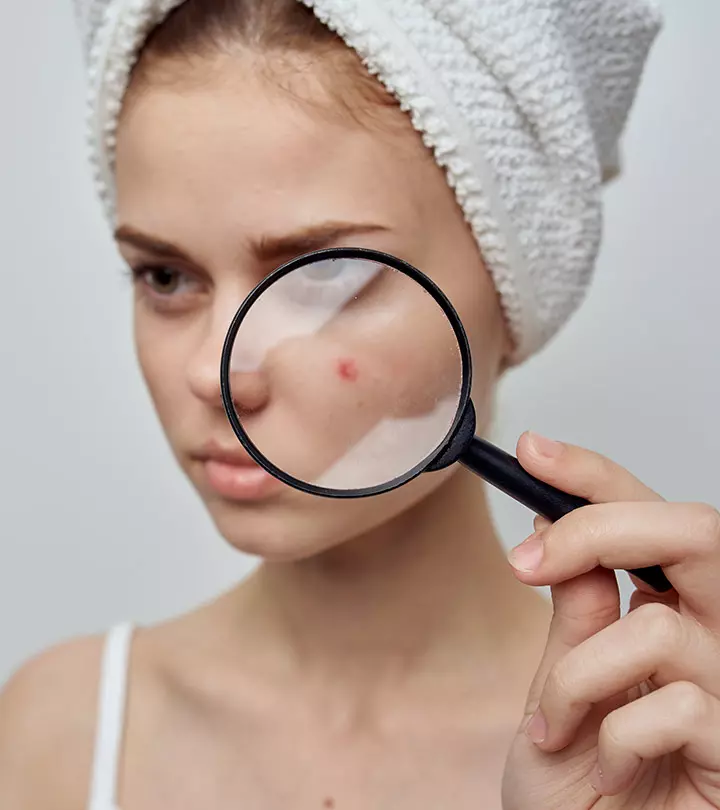
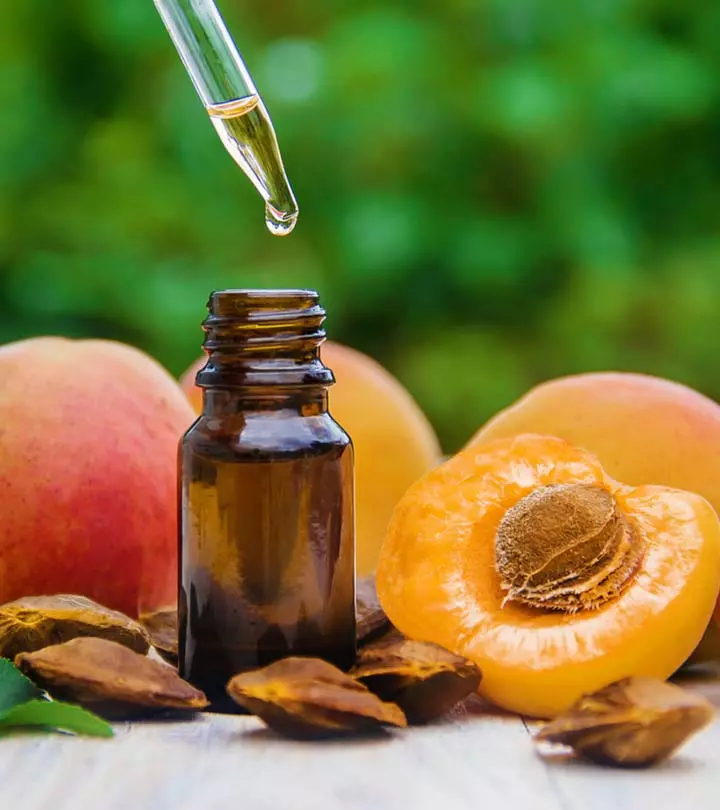
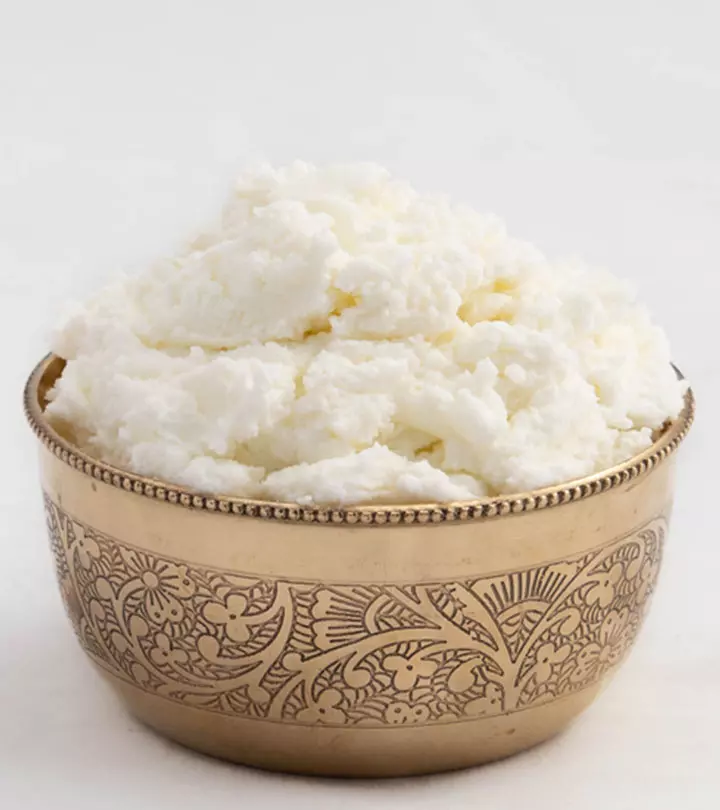
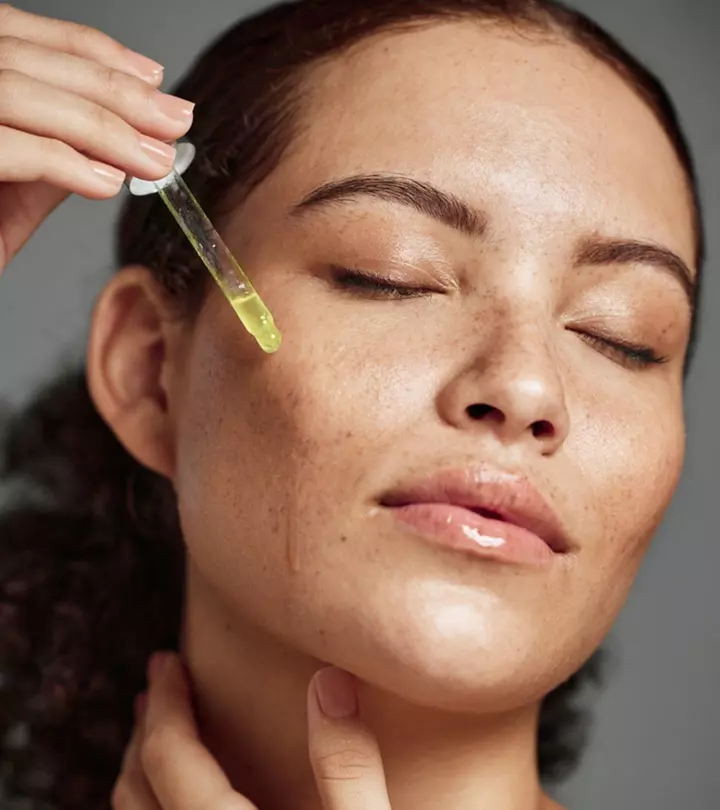
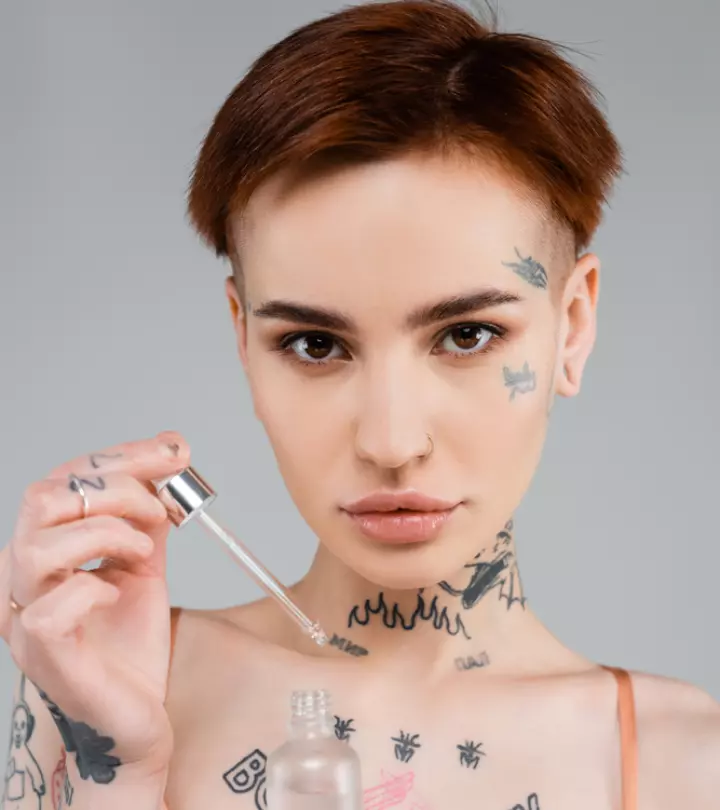
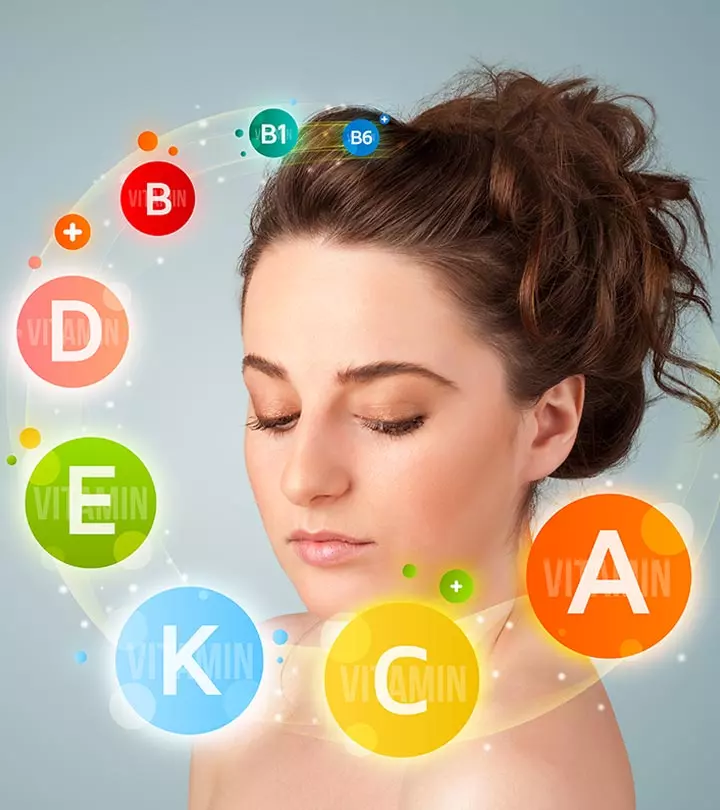













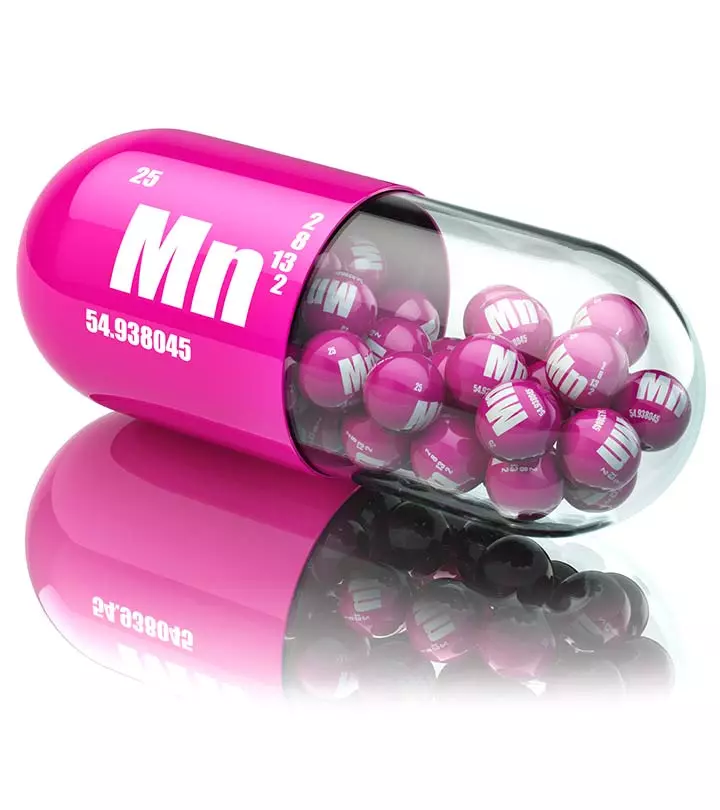
Community Experiences
Join the conversation and become a part of our empowering community! Share your stories, experiences, and insights to connect with other beauty, lifestyle, and health enthusiasts.